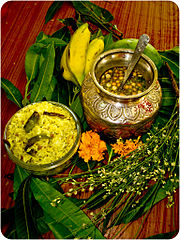Ugadi
For other traditions of celebrating the lunar new year, see
Lunar New Year.
| Ugadi |
|---|
 Ugadi Pachadi with New Year prayer puja tray |
| Also called | Yugadi, Samvatsaradi
Telugu and Kannada New Year |
|---|
| Observed by | Hindus in Telangana, Andhra Pradesh, Karnataka, Telugu diaspora,Kannadigas |
|---|
| Type | Religious (Hindu), social, cultural |
|---|
| Celebrations | Muggu-Rangoli, visiting Temples, Feast with Holige and Bevu Bella |
|---|
| Date | caitra māsa, śukla pakṣa, prathama tithi |
|---|
| 2021 date | 13 April (Tue) |
|---|
| 2022 date | 2 Apr (Sat) |
|---|
| 2023 date | 22 Mar (Wed) |
|---|
| Frequency | Annual |
|---|
| Related to | Gudi Padwa
Marathi New Year's day |
|---|
Ugadi or Yugadi, also known as Samvatsarādi (lit. 'Beginning of the Year'), is the New Year's Day according to the Hindu Calendar and is celebrated in the states of Andhra Pradesh, Telangana, and Karnataka in India.[1] It is festively observed in these regions on the first day of the Hindu lunisolar calendar month of Chaitra.[2] This typically falls in April month of the Gregorian calendar.[2]And also It is falls in Tamil month Panguni or Chithrai (Sometimes) on Day after Amavasya with 27th Nakshatra Revati.
Interestingly, Ugadi day is pivoted on the first New Moon after March Equinox.
The day is observed by drawing colourful patterns on the floor called Muggulu, mango leaf decorations on doors called torana,
buying and giving gifts such as new clothes, giving charity to the
poor, oil massage followed by special bath, preparing and sharing a
special food called pachadi, and visiting Hindu temples.[3][4] The pachadi is a notable festive food that combines all flavors – sweet, sour, salty, bitter, astringent and piquant.
In Telugu and Kannada Hindu traditions, it is a symbolic reminder that
one must expect all flavors of experiences in the coming new year and
make the most of them.[5] Followers of the Souramana calendar system, observe Ugadi in Karnataka, when the Sun transits into the Aries Constellation, which is also the festival of Baisakhi, and is locally known as Souramana Ugadi or Mesha Sankranti.[6]
Ugadi has been an important and historic festival of the Hindus,
with medieval texts and inscriptions recording major charitable
donations to Hindu temples and community centers on this day.[7] The same day is observed as a New Year by Hindus in many other parts of India, such as Gudi Padwa in Maharashtra and is a national public holiday in Mauritius
Practices
Muggu (rangoli) arrangement in April 2009
The Kannada, Kodava, Telugu and the Tulu diaspora in Andhra Pradesh, Karnataka and Tamil Nadu
celebrate the festival with great fanfare; gatherings of the extended
family and a sumptuous feast are 'de rigueur'. The day begins early with
ritual showers, rubbing the body with perfumed oil, followed by
prayers.[4]
Ugadi Pacchadi (right) is a symbolic dish prepared by Hindu people on this festival
Preparations for the festival begin a week ahead. Houses are given a thorough clean.[4]
People buy new clothes and Dhoti and buy new items for the festival,
decorate the entrance of their houses with fresh mango leaves.[3]
Mango leaves and coconuts are considered auspicious in the Hindu
tradition, and they are used on Ugadi. People also clean the front of
their house with water and cow dung paste, then draw colorful floral
designs.[3] People offer prayer in temples. The celebration of Ugadi is marked by religious zeal and social merriment.[12][5][13][14]
According to Vasudha Narayanan, a professor of Religion at the University of Florida:[15]
The pacchadi festive dish symbolically reminds the people that the
following year – as all of life – will consist of not just sweet
experiences, but a combination of sweet, sour, salty, and bitter
episodes. Just as the different substances are bound together, one is
reminded that no event or episode is wholly good or bad. Even in the
midst of bitter experiences, there are sweet moments. One is also
reminded that the experience of taste is transitory and ephemeral; so
too, is life, and one has to learn to put pain and pleasure in proper
temporal perspective.[5]
Special dishes are prepared for the occasion. In Karnataka eatables Holige, Obattu and mango pickles are made .In
Andhra Pradesh
eatables such as "pulihora, bobbatlu (Bhakshalu/ polelu/ oligale), New
Year Burelu and Pachadi" and preparations made with raw mango go well
with the occasion. Of these,
pachadi (or
Ugadi pacchadi) is the most notable, and consists of a chutney-like dish which combines ingredients to give all six flavours of food (
షడ్రుచులు - ṣaḍruculu) : sweet (
తీపి - tīpi), sour (
పులుపు - pulupu), salty (
ఉప్పు - uppu), spicy (
కారం - kāraṁ), bitter (
చేదు - cēdu) and
astringent (
వగరు -
vagaru).
[16]
This festive Hindu food is made from tamarind paste (sour), neem
flowers (bitter), brown sugar or sweet jaggery (sweet), table salt
(salt), green chilli (spicy) and raw mango (astringent). It is a
symbolic reminder of complex phases of life one should reasonably expect
in the new year.
[15][1





No comments:
Post a Comment